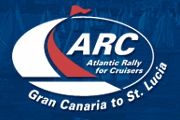|
What gave you the idea of setting up the ARC?
In 1985 I’d come back from sailing round the world
with my family and was writing for Yachting World. I went down to
Las
Palmas to interview as many skippers as possible as they were
preparing to cross the Atlantic.
As I was interviewing them, three
or four boats were leaving every day and it struck me that there was this
air of sadness. I thought: these people are all planning to do more or
less the same thing, but they’re doing it on their own. Wouldn’t it be a
good idea to get together and leave as a group and keep all those social
contacts they already had?
I asked skippers what they thought and
most said it was a fantastic idea. So I asked the tourist board and port
authority if they would help me organise a rally from Las Palmas and they
said they would.
When I got back to London I talked to Dick Johnson, then
editor of Yachting World. He was extremely enthusiastic and a great
supporter from the very beginning. We had a launch party for the ARC a few
months later and very soon afterwards we started getting a flood of
letters that kept on coming.
What was the first ARC in 1986 like?
The idea was for people to just turn up in
Las Palmas
- there was only a short entry form. We knew we’d have a lot of boats,
maybe 150, but in the end we started with 204 boats. There was a fantastic
atmosphere and the send off from Las Palmas was
tremendous.
Everything went fine, and after I received the boats in
Barbados I came back to
London and
thought: ‘Very nice. That’s it.’ But then the letters started coming
asking if we were going to run a rally next year. So I started a company
called World Cruising and we started preparing for the second
ARC.
Again it was extremely successful, with 196 boats, and
the rest is history.
How did the ARC develop in the early years?
We started providing tours of
the island and entertainment because I wanted people to relax before the
Atlantic crossing. I went to the supermarkets and got them to send buses
to take people there and deliver shopping to the
marina.
By the third ARC we were encouraging people to have
shortwave radio and keep in touch, but the structure of the rally didn’t
change much.
When did it become a race as well as a cruising
rally?
Fairly early on I persuaded the Royal Ocean Racing Club, which
had its own race from Las Palmas to
Antigua, to run the race within the
framework of the ARC as a racing
division.
But I was very aware from the beginning of keeping
the right balance. The ARC had its own profile of an amateur event for
amateurs and I wanted to keep it that way.
The nature of that has not changed over the years, has
it?
No it hasn’t. We have faster boats, better
equipment, certainly much better communications, but the challenges of
crossing an ocean are basically unchanged. And that’s why the ARC still
has a role and I’m sure its continued success is assured.
Do you think the yachts or the sailors have changed in any
way?
There is a perception among many people that
because boats are faster than they were 25 years ago they are better. They
are not better in every respect. The equipment is better, there are more
safety features, there are better aids to navigation, but there are still
boats getting into trouble.
Now because we have instant communications people
are much more likely to ask for assistance rather than to solve the
problems, or even try to solve them, themselves. This It has
happened generally throughout cruising, so it has touched the
ARC.
Do you foresee many future changes in ocean
cruising?
As I say I think the ARC will continue to be very
successful and there will be a need for it. The people who take part may
change, the organisers may adapt to the requirements of the participants
or the age we live in.
Certainly a cruising boat gives you the
opportunity of seeing any part of the world, if you just try hard enough.
It is worth the effort, any effort. If you really, really want to go
sailing and cruising and see the world, this is the moment to do it. If I
you ask me if I’d go round the world again my answer would be: absolutely,
if I could, I’d go tomorrow.
| 
